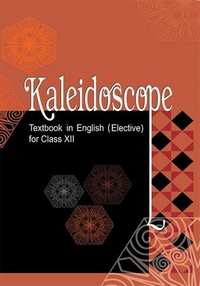Advertisements
Chapters
1: I Sell my Dreams
2: Eveline
3: A Wedding in Brownsville
4: Tomorrow
5: One Centimetre
Poetry
1: A Lecture Upon the Shadow
2: Poems by Milton
3: Poems by Blake
4: Kubla Khan
5: Trees
6: The Wild Swans at Coole
7: Time and Time Again
8: Blood
Non - Fiction
1: Freedom
2: The Mark on the Wall
3: Film-making
4: Why the Novel Matters
▶ 5: The Argumentative Indian
6: On Science Fiction
Drama
1: Chandalika
2: Broken Images

Advertisements
Solutions for Chapter 5: The Argumentative Indian
Below listed, you can find solutions for Chapter 5 of CBSE NCERT for English - Kaleidoscope Class 12.
NCERT solutions for English - Kaleidoscope Class 12 5 The Argumentative Indian Stop and Think [Pages 179 - 186]
Sen quotes Eliot’s lines: ‘Not farewell/But fare forward voyagers’. Distinguish between ‘faring forward’ (Krishna’s position in the Gita) and ‘faring well’ (the position that Sen advocates).
Sen draws a parallel between the moral dilemma in the Krishna-Arjuna dialogue and J. R. Oppenheimer’s response to the nuclear explosion in 1945. What is the basis for this?
Maitreyi’s remark—‘what should I do with that by which I do not become immortal’—is a rhetorical question cited to illustrate both the nature of the human predicament and the limitations of the material world. What is the connection that Sen draws between this and his concept of economic development?
It is important to see that the Indian argumentative tradition has frequently crossed the barriers of gender, caste, class, and community. List the examples cited by Sen to highlight this.
NCERT solutions for English - Kaleidoscope Class 12 5 The Argumentative Indian Understanding the Text [Pages 187 - 188]
What is Sen’s interpretation of the positions taken by Krishna and Arjuna in the debate between them?
[Note Sen’s comment: ‘Arjuna’s contrary arguments are not really vanquished... There remains a powerful case for ‘faring well’ and not just ‘faring forward’.]
What are the three major issues Sen discusses here in relation to India’s dialogic tradition?
Sen has sought here to dispel some misconceptions about democracy in India. What are these misconceptions?
How, according to Sen, has the tradition of public discussion and interactive reasoning helped the success of democracy in India?
NCERT solutions for English - Kaleidoscope Class 12 5 The Argumentative Indian Talking about the Text [Page 188]
Does Amartya Sen see argumentation as a positive or a negative value?
How is the message of the Gita generally understood and portrayed? What change in interpretation does Sen suggest?
NCERT solutions for English - Kaleidoscope Class 12 5 The Argumentative Indian Appreciation [Page 188]
This essay is an example of argumentative writing. Supporting statements with evidence is a feature of this kind of writing.
For each of the statements given below state the supportive evidence provided in the essay
(i) Prolixity is not alien to India.
(ii) The arguments are also, often enough, substantive.
(iii) This admiration for the Gita, and Krishna’s arguments, in particular, has been a lasting phenomenon in parts of European culture.
(iv) There remains a powerful case for ‘faring well’, and not just ‘forward’.
NCERT solutions for English - Kaleidoscope Class 12 5 The Argumentative Indian TASK [Page 190]
Examine the noun phrases in these sentences from the text
- The second woman head of the Indian National Congress, Nellie Sengupta, was elected in 1933.
- This concerns the relation—and the distance—between income and achievement.
- This may be particularly significant in understanding the class basis of the rapid spread of Buddhism, in particular, in India.
Solutions for 5: The Argumentative Indian

NCERT solutions for English - Kaleidoscope Class 12 chapter 5 - The Argumentative Indian
Shaalaa.com has the CBSE Mathematics English - Kaleidoscope Class 12 CBSE solutions in a manner that help students grasp basic concepts better and faster. The detailed, step-by-step solutions will help you understand the concepts better and clarify any confusion. NCERT solutions for Mathematics English - Kaleidoscope Class 12 CBSE 5 (The Argumentative Indian) include all questions with answers and detailed explanations. This will clear students' doubts about questions and improve their application skills while preparing for board exams.
Further, we at Shaalaa.com provide such solutions so students can prepare for written exams. NCERT textbook solutions can be a core help for self-study and provide excellent self-help guidance for students.
Concepts covered in English - Kaleidoscope Class 12 chapter 5 The Argumentative Indian are The Argumentative Indian, Grammar, Parallelism, Syllables, Figures of Speech, Punctuation, Parts of Speech, Rhyme Scheme, Pronunciation, Vocabulary, Capitalization, Pronoun, Direct-Indirect Speech, Verb, Types of Sentences, Idioms and Phrases, Tense, Orthography, Clauses, Writing Skills, Article Writing, Speech Writing, Report Writing, Note Making, Notice Writing, Letter Writing, Reading Skills, Unseen Passage Comprehension, Unseen Poem Comprehension.
Using NCERT English - Kaleidoscope Class 12 solutions The Argumentative Indian exercise by students is an easy way to prepare for the exams, as they involve solutions arranged chapter-wise and also page-wise. The questions involved in NCERT Solutions are essential questions that can be asked in the final exam. Maximum CBSE English - Kaleidoscope Class 12 students prefer NCERT Textbook Solutions to score more in exams.
Get the free view of Chapter 5, The Argumentative Indian English - Kaleidoscope Class 12 additional questions for Mathematics English - Kaleidoscope Class 12 CBSE, and you can use Shaalaa.com to keep it handy for your exam preparation.
